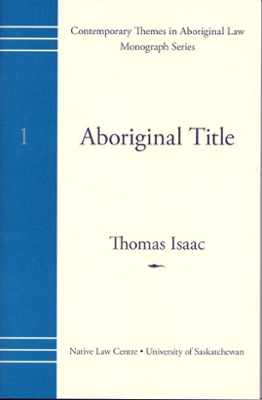Aboriginal Title
 |
Order through USask Bookstore Thomas Issac |
The 1997 Supreme Court of Canada decision in Delgamuukw v. British Columbia provided the Court with its first substantive opportunity to discuss the meaning of Aboriginal title within the context of subsection 35(1) of the Constitution Act, 1982. In its November 2004 decision in Haida Nation v. British Columbia (Minister of Forests), the Supreme Court of Canada confirmed that where the Crown contemplates action that could adversely affect asserted Aboriginal rights, including Aboriginal title, it has a duty to consult and, where appropriate, accommodate the affected Aboriginal group. In July 2005, almost eight years after the Delgamuukw decision, the Court had an opportunity to apply the Delgamuukw principles to a specific set of facts with the release of its decision in R. v. Marshall; R. v. Bernard, concerning Mi’kmaq claims of Aboriginal title in Nova Scotia and New Brunswick.
Against this backdrop, Thomas Isaac poses the question: What does proven Aboriginal title mean for Aboriginal peoples, for the Crown, and for third parties, including private property owners?
In answering this question, Isaac offers offers insightful guidance, analysis, and commentary regarding:
- the meaning and content of Aboriginal title;
- the relationship between Aboriginal title and private property;
- the remedies available to Aboriginal peoples facing infringements to proven Aboriginal title;
- the balancing of interests that the Supreme Court of Canada has developed between Aboriginal rights and title on the one hand, and the rights of non-Aboriginal Canadians on the other hand; and
- an understanding of what Aboriginal title means in practical terms, on Crown land and on land owned in fee simple.
Thomas Isaac is a partner with the law firm of McCarthy Tétrault LLP in Vancouver. He has published numerous books and many articles in the area and his published work has been cited with approval by numerous Canadian courts, including the Supreme Court of Canada.
